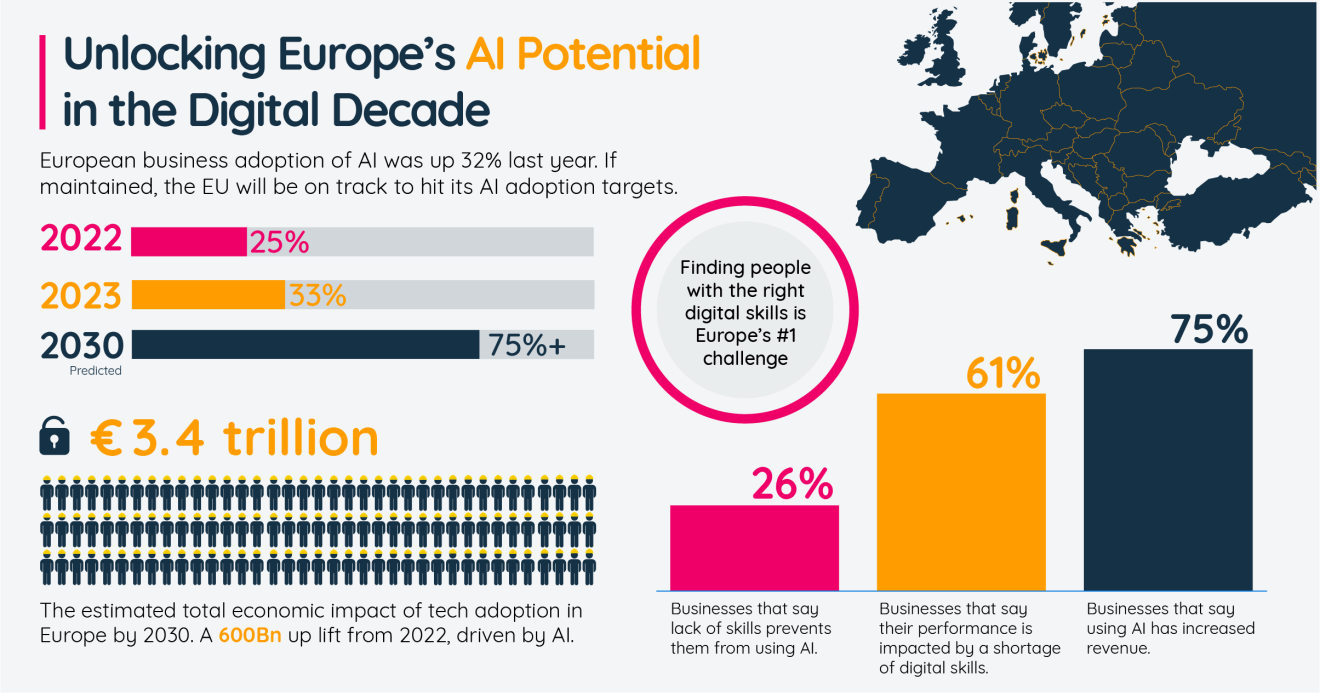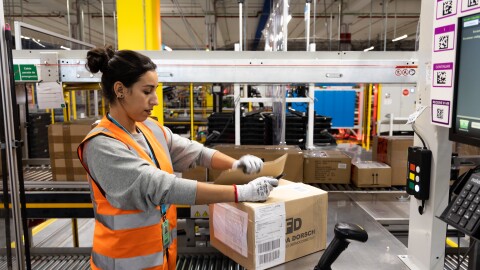This €600 billion is a figure equal to the value of the European construction industry, according to the independent report Unlocking Europe’s AI Potential in the Digital Decade, conducted by Strand Partners and commissioned by Amazon Web Services (AWS).[1] If realised, it would bring the estimated total economic impact of tech adoption in the region to €3.4 trillion by 2030, an increase from last year’s forecast of €2.8 trillion.
However, the report suggests that to unlock AI’s full potential, countries across Europe must tackle three critical issues: creating a pro-innovation environment; addressing Europe’s digital skills gap; and ensuring businesses of all sizes have access to the latest technologies.
Unlocking the power of AI for all
The positive economic impact of AI on European businesses is clear; three-quarters of firms that use AI report increased revenues and productivity as a result.[2] However, the use of AI and other digital technologies is currently skewed towards larger companies (51% vs. 31% of small to medium-sized enterprises (SMEs)). SMEs report significant barriers to AI adoption including finding the right talent, regulatory concerns, and the cost of implementation.
“Europe stands on the brink of an unprecedented opportunity,” said Tanuja Randery, Managing Director of AWS Europe, Middle East and Africa (EMEA). “Businesses recognise the benefits of AI to their growth and productivity. SMEs account for more than half of Europe’s GDP, and confronting the challenges holding back their digital journey is vital. To achieve AI’s full potential, it is imperative that Europe delivers the digital skills support and regulatory certainty to support the ambitions of businesses of all shapes and sizes.”
Netherlands-based AWS scale-up customer Growy is using AI to grow its business and its crops. The agro-tech business uses the Internet of Things (IoT) with AI to operate and monitor its fully automated and robotised farms, offering a glimpse into how AI can create a more sustainable future. “The benefits are too significant to ignore,” explained Jochem Meuwese, from Growy. “With AI, Growy has built fully automated vertical farms that increase crop yields, protect soil quality, and tackle food insecurity.”

Regulatory uncertainty and skills gap are holding back investment
A lack of digital skills is the most frequently cited challenge. Sixty-one per cent of European businesses said a digital skills gap impacts their business performance, while over a quarter (26%) said this has prevented them from adopting Al. With the European Commission set to fall eight million people short of its target to have at least 20 million employed as ICT specialists by 2030[3], addressing the digital skills gap is crucial to the democratisation of AI technology across Europe.
Regulatory uncertainty, alongside Europe’s persistent digital skills gap, is preventing businesses from using the technology to its fullest, despite its potential positive social and economic impact. The report highlights that 21% of European businesses identify compliance and legal uncertainties as a significant barrier to their adoption of digital technology. This rises to 45% among businesses that already use multiple AI technologies. Those citing such concerns plan to invest 48% less in technologies over the next three years, compared to those that don’t face such barriers. Addressing the skills and regulatory barriers that businesses face will be key to enabling AI innovation in Europe.
AWS has trained more than 900,000 people in the EU on cloud computing skills since 2017. This figure includes free and paid training. AWS is investing hundreds of millions of dollars to provide free cloud computing skills training to 29 million people by 2025, and has already trained more than 21 million people.
Democratising technology for positive change
Despite concerns regarding skills and regulation among businesses, half of Europeans believe AI will create more opportunities than risks with regard to job security and the future of work. Furthermore, 65% of Europeans anticipate that AI will transform healthcare and education over the next five years, and over half (52%) believe that AI will be important in addressing major societal challenges, such as climate change and disease control.
Cloud technology forms the foundation for the adoption of digital and AI technology. Over half (53%) of European businesses say that cloud computing has become more important to their business since 2022, while 80% say it is currently essential or important. If this appetite can be maintained, the EU could meet its target of 75% of businesses using cloud technology by 2030, a critical milestone in empowering all businesses to capitalise on the productivity and profitability benefits current AI users enjoy. AWS has been investing in Europe’s economic and digital future since 2007, investing billions through cloud and edge infrastructure, job creation, and product development.
To find out more about what’s needed to fuel Europe’s AI adoption boom, click here.
[1] Eurostat (2022) Key figures on European business: Construction
[2] This survey covered a representative sample of business leaders, from agriculture to utilities.
[3] European Commission (2023) Questions & Answers on the First report on the State of the Digital Decade












